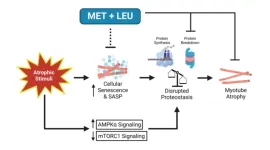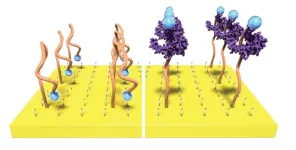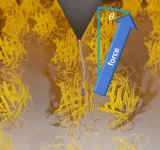(Press-News.org) **Note: the release below is a special early release from the European Congress of Clinical Microbiology & Infectious Diseases (ECCMID 2023, Copenhagen, 15-18 April). Please credit the conference if you use this story**
Embargo: 2301H UK time Friday 31 March
**Note – the press release is available in Spanish and Portuguese, see links below**
A 3-year-old girl was infected with an unusual Mycobacterium marinum infection, that developed following an iguana bite while she was on holiday in Costa Rica, report the doctors who treated her at this year’s European Congress of Clinical Microbiology & Infectious Diseases (ECCMID) in Copenhagen, Denmark (15-18 April).
The authors believe it is the first reported case of M. marinum infection following an iguana bite. M. marinum is a ubiquitous, non-tuberculous mycobacterium that causes a tuberculosis-like illness in fish and has been known to infect humans when skin wounds are exposed to contaminated fresh or salt water.
The toddler was sitting on the beach eating cake when the iguana suddenly ran up and bit her on the back of her left-hand before snatching the cake.
She was immediately taken to a local clinic and found to have a single, superficial wound on the back of the metacarpal bone of her middle finger. After disinfection, she was given five days of amoxicillin antibiotics for potential salmonella exposure (common after reptile bites), and the wound healed quickly without any issues.
Five-months later, however, the parents noted a small bump on the back of her left hand which gradually became larger, and the skin became red and mildly painful over the next 3 months.
The toddler attended the hospital at Stanford Children’s Health (Stanford, CA, USA) where an ultrasound revealed a mass consistent with a ganglion cyst (fluid-filled lump), but the location and symptoms were not in keeping with this.
The orthopaedic surgeon who removed the 2-cm thick-walled mass noticed a discharge of pus from the wound, indicating an infection.
Histological examination revealed extensive tissue death and necrotizing granulomatous inflammation (an area of inflammation where the tissue has died), and cultures yielded a pure growth of M. marinum. As M. marinum is resistant to common antibiotics including amoxicillin, the girl was started on rifampin and clarithromycin and responded well to therapy.
While organisms that cause infection after dog or cat bites are well known, the microbiological cause of infected wounds secondary to iguana bites is limited to a few case reports, with Serratia marcescens and Staphylococcus aureus most often implicated. Salmonella enterica is also possible, given 75-90% of both wild and captive reptiles (including snakes, turtles, and iguanas) are colonised with these bacteria.
Several studies have reported that domestic reptiles harbour non-tuberculous mycobacteria (NTM) given their abundance in fresh and salt water.
“M. marinum prefers lower temperatures (30◦C) for optimal growth, and it’s highly likely that the cold-blooded iguana, with body temperatures ranging from 22-37◦C, may sustain these microbes as reservoirs,” explains lead author Dr Jordan Mah from Stanford University School of Medicine, California, USA.
He continues, “The bite resulted in colonisation by a bacterium rarely found in humans, and demonstrates that iguanas may be carriers of harmful bacteria capable of producing severe infections. This may help inform health care professionals of less commonly known bacterial infections following unusual zoonotic exposures."
For interviews with the report authors, please contact Dr Jordan Kit Mah, Stanford University School of Medicine, Stanford, California, USA. Please e-mail to arrange interview. E) jmah19@stanford.edu
Alternative contact in the ECCMID Press Room: Tony Kirby T) + 44(0)7834 385827 E) tony@tonykirby.com
For press release in Spanish, click here
For press release in Portuguese, click here
Notes to editors:
This press release is based on oral presentation 6564 at the European Congress of Clinical Microbiology & Infectious Diseases (ECCMID). All accepted abstracts have been extensively peer reviewed by the congress selection committee. There is no full paper at this stage, but the authors are happy to answer your questions. The research has been submitted to a medical journal for publication.
END
Iguana stole my cake! and left behind a nasty surprise
Never get between an iguana and his cake – a cautionary tale of a toddler infected with bacteria that cause tuberculosis-like illness in fish, following an iguana bite
2023-04-01
ELSE PRESS RELEASES FROM THIS DATE:
Combination therapy a promising option for advanced kidney cancer patients already treated with immunotherapy
2023-04-01
Study Title: Belzutifan plus cabozantinib for patients with advanced clear cell renal cell carcinoma previously treated with immunotherapy: an open-label, single-arm, phase 2 study
Publication: The Lancet Oncology, March 31, 2023, 6:30pm ET, https://www.thelancet.com/journals/lanonc/article/PIIS1470-2045(23)00097-9/fulltext
Dana-Farber Cancer Institute author: Toni K. Choueiri, MD
Summary:
Immunotherapies, such as anti-PD-1 and anti-PD-L1, have become standard first line therapies for patients with advanced renal cell carcinoma (kidney cancer). Most patients, however, eventually experience disease progression, with no consensus on what therapy to use next. In this ...
Final Human Brain Project Summit closes with a vision for the future of digital brain research
2023-04-01
The ten-year European Flagship Human Brain Project (HBP) links brain research with computing and technology in a large-scale, interdisciplinary approach. During the HBP Summit, researchers presented the abundant scientific achievements of the project and the legacy that it will leave for the research community. With the project approaching its conclusion in September 2023, a focal point of the final HBP Summit in Marseille was the discussion of the future of digital brain research.
One of the lasting contributions of the project is the research infrastructure EBRAINS, which provides open access to advanced technologies, tools, data and services for brain research and will ...
Metformin & leucine prevent cellular senescence & proteostasis disruption
2023-03-31
“Cellular senescence and disrupted proteostasis induced by myotube atrophy are prevented with low-dose metformin and leucine cocktail.”
BUFFALO, NY- March 31, 2023 – A new research paper was published on the cover of Aging (listed by MEDLINE/PubMed as "Aging (Albany NY)" and "Aging-US" by Web of Science) Volume 15, Issue 6, entitled, “Cellular senescence and disrupted proteostasis induced by myotube atrophy are prevented with low-dose metformin and leucine cocktail.”
Aging coincides with the accumulation of senescent cells within skeletal muscle that produce inflammatory products, known as the senescence-associated secretory ...
Plastic transistor amplifies biochemical sensing signal
2023-03-31
Molecules in our body send faint biochemical signals when health issues arise
New technology boosts these signals by 1,000 times
New approach paves way for sensing signals in real-time in the body without sending blood or saliva samples to a lab
EVANSTON, Ill. — The molecules in our bodies are in constant communication. Some of these molecules provide a biochemical fingerprint that could indicate how a wound is healing, whether or not a cancer treatment is working or that a virus has invaded the body. If we could sense these signals in ...
Childhood asthma declines during COVID-19 pandemic
2023-03-31
Half as many children in the United States were diagnosed with asthma in the first year of the COVID-19 pandemic compared to previous years, and Rutgers researchers think fewer colds may be part of the reason.
In a new Rutgers study, published in Respiratory Research, researchers examined the rates of new asthma diagnoses in a large commercial insurance claims database during the first year of the pandemic compared with rates of new diagnoses during the previous three years.
Using the Health Core Integrated Research ...
Study shows ketamine could be beneficial for treating brain injury in children
2023-03-31
A common anesthesia drug could be beneficial in reducing pressure inside the skull of children with traumatic brain injuries (TBI), according to a study published in Critical Care Medicine.
Ketamine, a drug that has been used for anesthesia since the 1970s, has traditionally been avoided for patients with TBI due to early studies suggesting that it could raise the pressure inside of the skull, known as intracranial pressure (ICP).
More recent studies have suggested otherwise, said lead author Michael Wolf, MD, assistant professor of Pediatrics and Neurological ...
Yak milk consumption among Mongol Empire elites
2023-03-31
Photos
For the first time, researchers have pinpointed a date when elite Mongol Empire people were drinking yak milk, according to a study co-led by a University of Michigan researcher.
By analyzing proteins found within ancient dental calculus, an international team of researchers provides direct evidence for consumption of milk from multiple ruminants, including yak. In addition, they discovered milk and blood proteins associated with both horses and ruminants. The team's results are published in Communication Biology.
The study presents novel protein findings from an elite Mongol Era cemetery ...
Hope for salamanders? Illinois study recalibrates climate change effects
2023-03-31
URBANA, Ill. – For tiny salamanders squirming skin-to-soil, big-picture weather patterns may seem as far away as outer space. But for decades, scientists have mostly relied on free-air temperature data at large spatial scales to predict future salamander distributions under climate change. The outlook was dire for the mini ecosystem engineers, suggesting near elimination of habitat in crucial areas.
Now, University of Illinois researchers are tuning into the microclimates that really matter to the imperiled amphibians and forecasting a somewhat more hopeful future.
“The ...
Engineered E. coli delivers therapeutic nanobodies to the gut
2023-03-31
BOSTON-- Humans are colonized with thousands of bacterial strains. Researchers are now focused on genetically modifying such bacteria to enhance their intrinsic therapeutic properties.
One goal is to develop smart microbes that release therapeutic payloads at sites of disease, thus maintaining therapeutic efficacy while limiting many of the side effects that can be associated with the systemic administration of conventional drugs.
Investigators at Massachusetts General Hospital (MGH), a founding member of Mass General Brigham (MGB), have engineered a strain of the probiotic Escherichia ...
New type of friction discovered in ligand-protein systems
2023-03-31
An interdisciplinary research team of the Institutes of Physical Chemistry and Physics of the University of Freiburg and the Max Planck Institute of Biophysics in Frankfurt-am-Main has discovered a new, direction-dependent friction in proteins called anisotropic friction. “Until now, nobody had observed that friction in biomolecules was dependent on direction,” says physicist Dr. Steffen Wolf of the University of Freiburg. The results have been published as cover story in the scientific journal “Nano Letters.”
Experiments on model complex of protein-ligands
Proteins constitute the microscopic machinery of cells. They perform work during their functional cycles. Accordingly, ...
LAST 30 PRESS RELEASES:
Black soldier fly larvae show promise for safe organic waste removal
People with COPD commonly misuse medications
How periodontitis-linked bacteria accelerate osteoporosis-like bone loss through the gut
Understanding how cells take up and use isolated ‘powerhouses’ to restore energy function
Ten-point plan to deliver climate education unveiled by experts
Team led by UC San Diego researchers selected for prestigious global cancer prize
Study: Reported crop yield gains from breeding may be overstated
Stem cells from human baby teeth show promise for treating cerebral palsy
Chimps’ love for crystals could help us understand our own ancestors’ fascination with these stones
Vaginal estrogen therapy not linked to cancer recurrence in survivors of endometrial cancer
How estrogen helps protect women from high blood pressure
Breaking the efficiency barrier: Researchers propose multi-stage solar system to harness the full spectrum
A new name, a new beginning: Building a green energy future together
From algorithms to atoms: How artificial intelligence is accelerating the discovery of next-generation energy materials
Loneliness linked to fear of embarrassment: teen research
New MOH–NUS Fellowship launched to strengthen everyday ethics in Singapore’s healthcare sector
Sungkyunkwan University researchers develop next-generation transparent electrode without rare metal indium
What's going on inside quantum computers?: New method simplifies process tomography
This ancient plant-eater had a twisted jaw and sideways-facing teeth
Jackdaw chicks listen to adults to learn about predators
Toxic algal bloom has taken a heavy toll on mental health
Beyond silicon: SKKU team presents Indium Selenide roadmap for ultra-low-power AI and quantum computing
Sugar comforts newborn babies during painful procedures
Pollen exposure linked to poorer exam results taken at the end of secondary school
7 hours 18 mins may be optimal sleep length for avoiding type 2 diabetes precursor
Around 6 deaths a year linked to clubbing in the UK
Children’s development set back years by Covid lockdowns, study reveals
Four decades of data give unique insight into the Sun’s inner life
Urban trees can absorb more CO₂ than cars emit during summer
Fund for Science and Technology awards $15 million to Scripps Oceanography
[Press-News.org] Iguana stole my cake! and left behind a nasty surpriseNever get between an iguana and his cake – a cautionary tale of a toddler infected with bacteria that cause tuberculosis-like illness in fish, following an iguana bite





